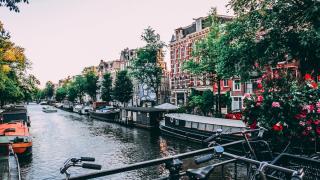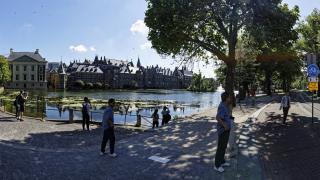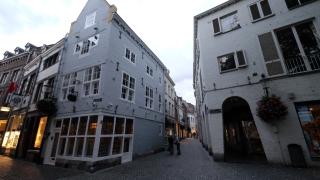Why Work in the Netherlands?
Dutch work culture values punctuality and direct communication. Standard full-time hours are 36-40 per week. Many offices close by 17:30. Lunch breaks are usually 30 minutes. Employees often cycle to work, even in cities like Amsterdam or Utrecht. Work-life balance is prioritized. Overtime is rare and discouraged. Paid holiday leave averages 25 days per year. English is widely used in workplaces, especially in Amsterdam, Rotterdam, and The Hague. Dutch companies often offer flexible hours and remote work options. International teams are common in tech, finance, and logistics sectors. Monthly gross salaries for skilled roles start around €2,800. Social security and pension contributions are deducted from pay. The 30% ruling offers tax benefits for skilled foreign workers. Freelancers (zzp’ers) must register with the Kamer van Koophandel (KvK). Many expats work in IT, engineering, and creative industries. Seasonal jobs in agriculture and hospitality attract travelers. EU citizens can work without a permit. Non-EU nationals need a residence permit (verblijfsvergunning).
Foreigners working in the Netherlands need a valid residence permit or work visa. EU, EEA, and Swiss citizens do not need a work permit (TWV) or residence permit. Non-EU nationals usually need both. Main permit types:
- Short-stay visa (Schengen): For work up to 90 days. Apply at Dutch embassy. Employer may need a TWV.
- Highly Skilled Migrant (Kennismigrant): For skilled professionals. Employer must be IND-recognized sponsor. Minimum salary: €5,008/month (2024, age 30+).
- Seasonal work: For agriculture or horticulture. Maximum 24 weeks. Employer applies for TWV.
- Orientation Year (Zoekjaar): For recent graduates from Dutch universities. Allows job search for 1 year.
Application process:
- Employer often applies for permits through the IND (Immigratie- en Naturalisatiedienst).
- Processing times: 2-7 weeks for most permits.
- Required documents: valid passport, employment contract, proof of qualifications, health insurance.
Tips:
- Start application before arrival in the Netherlands.
- All documents must be in Dutch, English, French, or German.
- Fees: €350-€3500, depending on permit type.
Useful resources:
- IND official website: ind.nl
- UWV (Employee Insurance Agency) for TWV: werk.nl
- Expat centers in Amsterdam, Rotterdam, Eindhoven for in-person help.
Finding a Job Dutch-Style
The Dutch job market favors skilled workers in IT, engineering, healthcare, logistics, and finance. Amsterdam, Rotterdam, and Eindhoven have many tech and startup roles. English-speaking jobs are common in international companies. Hospitality and agriculture offer seasonal work, especially in spring and summer. Popular job sites include Indeed.nl, LinkedIn, and Nationale Vacaturebank. Expatica Jobs and IamExpat.nl list roles for internationals. Uitzendbureaus (temp agencies) like Randstad and Tempo-Team help with short-term and student jobs. Dutch CVs are concise—one or two pages. List education, work experience, and language skills. Include a short, direct cover letter. Dutch employers value punctuality, honesty, and clear motivation. Interviews are structured. Expect direct questions about your skills and experience. Dress code is business casual unless stated otherwise. Most interviews last 30-60 minutes. For part-time jobs, minimum wage for those over 21 is €12.12 per hour (2024). Student jobs are common in retail, hospitality, and delivery services. Networking is important—join LinkedIn groups, Meetup events, and expat communities. Many jobs require at least basic Dutch, but English is often enough in larger cities. Recruitment processes can take several weeks. Always follow up after interviews with a thank-you email.
Inside the Dutch Workplace
Work hours: Most Dutch offices open 08:30-09:00 and close by 17:00-17:30. Overtime is rare. Vacation: Full-time employees get at least 20 paid vacation days per year, plus 8% holiday allowance (vakantiegeld) in May. Hierarchy: Dutch workplaces are flat. Managers are called by first names. Decisions are made by consensus (poldermodel). Communication: Directness is valued. Feedback is honest, not personal. Meetings are frequent and punctual. Dress code: Business casual is standard. Suits are rare outside finance or law. Jeans and sneakers are common in tech. Language: Many workplaces use English, especially in Amsterdam, Utrecht, and Eindhoven. Dutch is preferred in government and small firms. Office etiquette: Bring your own lunch (boterhammen) or join colleagues in the kantine. Hot lunches are uncommon. Social life: Friday afternoon drinks (vrijmibo) are popular. Coffee breaks (koffiepauze) happen twice daily. Birthday treats (traktatie) are shared with colleagues. Remote work: Hybrid work is common. Many work from home two days per week. Punctuality: Being late is frowned upon. Always inform if delayed.
Practical Tips for a Smooth Start
Register with your gemeente (municipality) within five days of arrival. You will receive a BSN (Burgerservicenummer). This number is required for work, taxes, and healthcare. Appointments can be booked online. Processing usually takes 1-2 weeks.
Open a Dutch bank account. Most employers pay salaries only to Dutch IBAN accounts. Bring your BSN, passport, and proof of address. ING, ABN AMRO, and Rabobank are common choices. Monthly fees start from €1.50.
Health insurance is mandatory for workers. Arrange Dutch basic health insurance (basisverzekering) within four months of registering. Average monthly premium is €130. Fines apply if you delay.
Cycling is the main commute mode. Most cities have dedicated bike lanes. Second-hand bikes cost €100-€250. OV-fiets rental is €4.45 per 24 hours at train stations.
Public transport uses the OV-chipkaart. A personal card costs €7.50 and can be topped up online. NS trains, GVB trams, and buses accept it.
Find support at expat centers in Amsterdam, Eindhoven, and The Hague. Meetup.com and Internations host regular expat events. Many cities have international communities and language cafes.
Quick Reference: Working Checklist
Checklist for starting work in the Netherlands:
- Register at your gemeente for a BSN within five days. Needed for contracts and salary.
- Open a Dutch bank account (ING, ABN AMRO, Rabobank). Required for salary payments.
- Get Dutch health insurance within four months. Monthly cost: €120–€150.
- Sign up for DigiD at digid.nl for online government access.
- Review your employment contract. Dutch contracts often include a probation period (proeftijd) of one or two months.
- Check CAO (collective labour agreement) rules for your sector at rijksoverheid.nl.
- Contact the Belastingdienst for tax questions. File annual tax returns by May 1.
- Use werk.nl and uwv.nl for job and benefit information.
- Keep all official documents and deadlines in a secure place.












